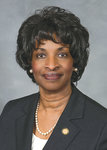

Over the last two years, Democratic legislators in the N.C. General Assembly have generally taken a less-than-hopeful tone about their policy goals.
But according to Chatham’s Democratic representatives — Sen. Valerie Foushee and Rep. Robert Reives II — there has been a change.
“It’s been a different feel for me,” Foushee said at a recent legislative breakfast with county leaders. “I do feel that we have more balance in governance for the state of North Carolina right now.”
Last November, the Democrats took back nine seats in the N.C. House and six in the N.C. Senate, breaking the GOP’s supermajority in both chambers. The practical result is that it would take more than a party-line vote to override a veto by Democratic Gov. Roy Cooper.
Back in December, Reives told the News + Record that the change, however slight, in power structure “forces everybody to talk to each other” and “provides an extra check and balance.”
Foushee reckons that there’s already been fruit from that. At the legislative breakfast, she spoke specifically about Senate Bill 28. Introduced by a pair of Republicans, the bill would “reinstate education-based salary supplements for certain teachers.” Advanced pay would be given to a broader group of personnel who have master’s or doctoral degrees and meet other requirement.
The bill, filed on Feb. 7, has already been co-sponsored by three Senate Republicans and several Senate Democrats, including Foushee, who said SB 28 “moves forward part of our agenda.”
“We’ve been trying to get this done for four to five years,” she said. “To have a situation whereby now we see a possibility of bringing something we believe should happen in North Carolina, we jumped on it. That’s the way government is supposed to work.”
It’s still early days, and the bill is in the Senate Rules Committee. The last change to master’s pay happened in the 2014 budget bill, so it’s possible this won’t be decided until the budget process.
Reives said that while there’s still some uncertainties about how the session will proceed, but acknowledges a change is happening, and may affect issues like Medicaid expansion and redistricting reform.
“We just don’t know what the tenor is going to be,” Reives said. “I think we’ve got opportunities. I hold out hope. I hope that doesn’t get squashed, but I do think we’re headed in a much better direction so far.”
Foushee, who is beginning her fourth term in the state Senate, said there’s been a shift in optimism on the Democratic side, which encourages her.
“I’m at a place now where I believe some things will happen,” she said. “I believe the state will benefit.”

Foushee
Foushee

Reives
Reives